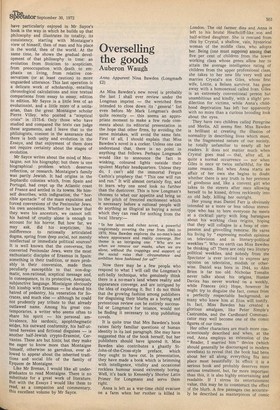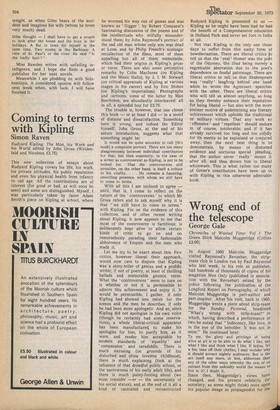Overselling the goods
Auberon Waugh
Anna Apparent Nina Bawden (Longmarfs E2) As Miss Bawden's new novel is probably the last I shall ever review under the Longman imprint — the wretched firm intended to close down its ' general ' list even before Mr Mark Longman's death quite recently — this seems an appropriate moment to make a few rude comments about its editorial presentation in the hope that other firms, by avoiding the same mistakes, will avoid the same fate. First Of all, I should explain that Miss Bawden's novel is a corker. Unless one can understand that, there is no point in anything that follows. Perhaps Longman's would like to announce the fact in winking, coloured lights outside their opulent Mayfair headquarters. Unless they do, I can't add the immortal Fergus Cashin's prophecy that "This one will run and run." It will almost certainly flop, and to learn why one need look no further than the dustcover. This is how Longman's chooses to whet our appetite and bring us to the pitch of frenzied excitement which is necessary before a rational people will do anything as illogical as buying a novel which they can read for nothing from the local library:—
" In her latest and richer novel, a powerful tragicomedy covering the year from 1940 to 1970, Nina Bawden explores the no-man's-land where appearance and reality converge. Her theme is an intriguing one: "Who are we when we remove our masks, when we are alone, without the trappings and support of the social roles that circumstance and ambition have fashioned for us?"
Now there may be a few people who respond to what I will call the Longman's soft-belly technique, who genuinely think there is a no-man's land where reality and appearance converge, and are intrigued by the idea of exploring it. But I do not think that the growing fashion among publishers for disguising their blurbs as a boring and pretentious review can be entirely successful or Longman's for intance, would not be finding it necessary to stop publishing novels.
It is quite true that Mrs Bawden's book raises fairly familiar questions of human identity in its last paragraph. She may have suggested this of the book herself, but her publishers should have ignored it. Miss Bawden also contributes a ghastly StJohn-of-the-Cross-style preface, which they ought to have cut. In presentation, they have made a book which is brimming with intelligence, vitality and occasional reckless humour sound extremely boring. Well, it's back to Kennedy's Shorter Latin Primer for Longmans and serve them right.
Anna is left as a war-time child evacuee on a farm when her mother is killed in
London. The old farmer dies and Anna is left to his brutal Heathcliff-like son and half-witted daughter. She is rescued from this by Crystal, a shallow, vain, hysterical woman of the middle class, who adopts her. Being (one must suppose) among that five per cent of children from the lower working class whose genes allow her to attain the average intelligence rating of children from the upper professional class, she takes to her new life very well and marries Crystal's son Giles, whose first wife, Lottie, a Belsen survivor, has gone away with a homosexual called Ivan. Giles is an extremely conventional person but unambitious and kindly, with a slight predilection for victims, while Anna's childhood deprivation has left her apparently with no more than a curious brooding look about the eyes.
They have two children called Peregrine and Merlin. All seems fine. Miss Bawden is brilliant at creating the illusion of normality in describing lives which must, in the fragmented nature of our society, be totally unfamiliar to nearly all her readers. It does not matter much when Crystal goes mad — that, after all, is quite a normal occurrence — nor when Giles is once or twice unfaithful, for the same reason. But when Anna starts an affair of her own she begins to doubt whether there is any truth in her pretence of goodness and, like a convent girl who takes to the streets after once allowing herself to be kissed, drives recklessly into an old lady, killing her outright.
Her young man Daniel Farr is obviously intended as a more or less odious stereotype who has to bore everyone he meets at a cocktail party with long harangues about his working class origins, hoping that they will collapse in a heap of compassion and grovelling remorse. He earns his living by "expressing modish opinions on television and in literary-political weeklies ". Who on earth can Miss Bawden be thinking of? There are only two literary political weeklies, and nobody from the Spectator is ever invited to express any opinion on television,, modish or otherwise. Daniel was born in 1944, so Alan Brien is far too old. Nicholas Tomalin never talks about his origins, Hunter Davies has never worked on a weekly, while Frances (sic) Hope, however he might try to disguise the fact, comes from a perfectly respectable background, as many who knew him at Eton will testify. In fact, Miss Bawden has created a glorious amalgam, like Peter Simple's Castrumba, and the Cardboard Communicator may well become one of the comic figures of our time.
Her other characters are much more con scientiously described and when, at the end, Anna employs an extension of the " Reader, I married him " device (which should generally be discouraged in modern novelists) to reveal that the book had been about her all along, everything fits into place most beautifully. In effect it is a serious book and probably deserves more serious treatment, but, far more important than this, it is also highly entertaining and readable. If I stress its entertainment value, this may be to counteract the effect of the blurb. A few passages can accurately be described as masterpieces of comic insight, as when Giles hears of the accident and imagines his wife (whom he loves very much) dead.
Giles thought — I shall have to get a couple to look after the house and the boys in the holidays. A flat in town for myself in the term time. Two rooms in the Barbican: A view of St. Paul's or the river. He said " Is she badly hurt ? "
Miss Bawden writes with unfailing intelligence, and I hope she finds a good publisher for her next novels.
Meanwhile I am plodding on with Solzhenitsyn. A considered opinion will follow next week when, with luck, I will have finished it.











































 Previous page
Previous page